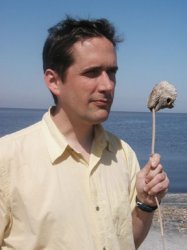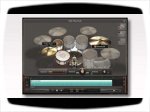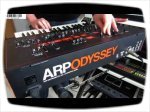Tom Erbe, Father of SoundHack, Interviewed (Pt. I)
Nov 24, 2003 - by Peter Kirn
A chat with composer and developer Tom Erbe. Tom has become legendary in the Mac music community for creating SoundHack, the free spectral sound processing software. Tom has been involved with various other projects from his own music to the creation of an electronic violin and spatial audio processing for NASA. I spoke to Tom about music and technology on the Mac on the eve of the release of new realtime audio plugins inspired by SoundHack.
-
PK: Let's start by talking about past work, since I think that's how many people know you best (for now, anyway, until they see the new plugins). Do you mind being known as "the guy who developed SoundHack"? I think you're something of a celebrity for having been behind this landmark piece of Mac software.
TE: Not at all. SoundHack was my main thing for a long time, and I poured a lot of effort into it. It was the place I put my ideas. I did have something of a mission with SoundHack. I wanted to take some computer music techniques that were only used in academia, and get them out there so that all types of musicians could use them.
PK: And it would seem you've succeeded. I'm always impressed by the number of people using this one little application, and in such a variety of ways, even today. Have you been surprised at all by the response, or how it's been used?
TE: It grew rather slowly at first . . . but yes, it was surprising.
PK: Have there been any sounds or music that came out of work with SoundHack that surprised you?
TE: Surprising sounds are one of my favorite things. I did like it when I saw the IMAX film on the Titanic. There were some convolved sounds of underwater screaming. Bruno Degazio (sp?) did that soundtrack. Now musicians are more familar with spectral techniques, so it's not so easy to identify SoundHack in the mix anymore. That's good news, people are going far beyond the easy and obvious.
PK: Yes, absolutely! And maybe as people get more used to these techniques, too, even in SoundHack, that will continue to drive people to try for the unexpected. For me, at least, I know part of why SoundHack stays in my Dock is that I still find, with convolution especially, sounds that surprise me.
TE: Convolution is one technique that keeps SH alive. It's not so easy to pull off in real time, though some people are getting closer. Using it as a sampling reverb is a great direction, but I think that it is as a cross-synthesis tool that convolution really shines. It is so unexpected how two sounds will resonate through each other.
PK: Exactly. It has this strange feeling of alchemy to it, still, after years of SoundHack convolution! SoundHack's process has such a unique sound to it, too. It seems no one else has implemented it quite like you, largely because of the non-realtime component. What is it about your approach, do you think, that is unique? (I guess it's the combination of large FFT frame sizes and the time-stretching side effect of adding up sample lengths?)
TE: That's it... SoundHack does a convolution on the entire "impulse" file, with no dividing into smaller chunks. That gives a phase shift that is as long as the impulse window. You not only get transformation of the frequency components, but also a cross-synthesis of the envelope/articulation of the sounds as well.
PK: Yes, and it seems that hearing both at the same time (rather than as separate components) is part of what makes that effect so interesting.
TE: When you say "no one has implemented it quite like you", I have to admit, the implementation in SoundHack is about as simple of an implementation as possible!!!
PK: Yes, simple, though musically very effective, so isn't it odd, in a way, that no one else has tried something that simple?
TE: Actually most of the things I put in SoundHack, I put there because I knew that noone commercially would touch these processes. They were considered too slow to be marketable.
PK: Do you think any of these processes have a future in semi-realtime / quasi-realtime applications? Of course, we've already come a long way from leaving your Mac II to "think" about a convolution overnight.
TE: It's hard to predict which way things will go. But I will definitely be continuing my work, and most of my direction is now in real-time implementation. Convolution is one process that is waiting for faster computers.
PK: Which brings us to your realtime plugins . . .
TE: I had decided about 5 years ago that SH had gone as far as it could go. I am now reimplementing and extending most of the SoundHack processes into a series of plugins. I am trying to implement them in the order of the algorithms speed, hoping that computers will get faster as I finish them. Right now I am about to release a set of filters based on the binaural filter and the spectral dynamics processor from SoundHack.
PK: Excellent! So it really is like SoundHack Live. I expect the appeal will be even broader, with the plugin format. That's +binaural, +spectralgate, and +spectralcompand, as described on your site.
TE: +morphfilter will be in the first set, too, though it doesn't have any history in SoundHack. It is a pair of FIR filters, with drawable and/or learnable shape, adjustable positive and negative depth, and morphing between the two filters.
PK: So, perhaps by the time you're done we will have a convolution filter!
TE: Yes!! The second set will be based on the phase vocoder and other time/frequency warpers, and the third will explore cross-synthesis (spectral morphing, convolution, and hopefully some new tricks)
PK: Join us later this week for the conclusion to this interview, with more on the new plugins among some other closing thoughts, and Tom's connection to the new Gehry-designed Disney Hall in Los Angeles. Don't forget, you can add thoughts on anything in this issue and discuss with us by hitting the comments link.
| Be the first to comment on this article | |
You must be logged in as a registered member to use this feature!
Buy SoundHack
online at: |















